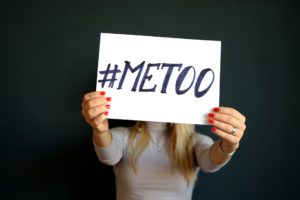The tide of change brought by the #MeToo movement and the enhanced focus on sexual assault may provide a wedge issue for young voters in the upcoming election, according to survey data released by the Harvard Public Opinion Project. HPOP surveyed 2,631 individuals between 18 and 29 years old, finding that support for #MeToo breaks down largely along party lines.
The #MeToo movement emerged in October 2017 when news of Harvey Weinstein’s predatory behavior spurred at least 85 women to accuse him of sexual harassment, and jumpstarted global dialogue surrounding sexual harassment, assault, and power.
The Harvard Youth Poll’s data on #MeToo is unique in that, unlike other polls on the topic, it specifically focuses on young people’s reactions to the movement. Other studies have focused on the consensus among women of all ages in favor of #MeToo. In contrast, the Harvard Youth data suggests that for young people, party affiliation is more relevant than gender for opinion on the #MeToo movement.
Around half of all surveyed Democrats reported that the #MeToo movement had a positive effect on society, while only 17.3 percent of Republicans thought so, indicating a harsh divide along party lines. The most common Republican response to the question “On balance, do you think the #MeToo movement has had a mostly positive or mostly negative effect on our society?” was “mixed,” with nearly 4 in 10 Republican respondents choosing this answer. 2 in 10 Republicans reported that the movement had a negative effect. In contrast, only 3.1 percent of surveyed Democrats saw #MeToo as having negative effect.
Moreover, Democrats were almost twice as likely to report having experienced sexual harassment themselves—22.4 percent of Democrats responded affirmatively to the survey question, while only 12.9 percent of Republicans did.
Partisan identification is a stronger predictor of support than gender. 38.7 percent of women surveyed reported #MeToo as having a positive effect on society, while 30.9 percent of men did as well. This relative equality is in stark contrast to the divide along party lines—51.7 percent of Democrats reported a positive effect versus just 17.3 percent of Republicans.
This data provides crucial insight into the minds of the generation most seemingly invigorated by the “Twitter activism” of #MeToo, and reveals the distance that movements for equality still must go to overcome entrenched partisanship.
It is likely that issues of sexual assault and workplace equality will remain in the public spotlight, given the vast impact of the #MeToo movement in putting sexual misconduct on the public radar. In upcoming elections, Democrats may use #MeToo and sexual assault as a rallying cry against their Republican foes, given the stark party divide on the issue existing among young voters.
Image Credit: Pixabay/Surdumihail
